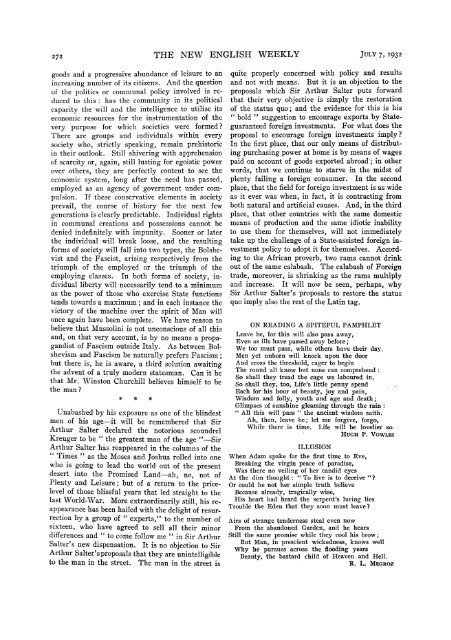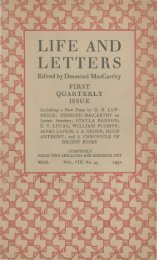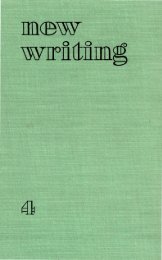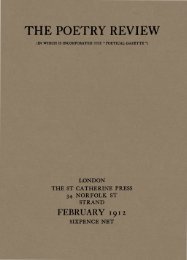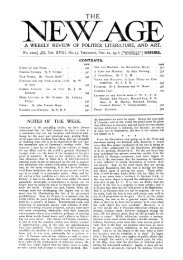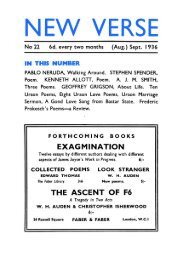Vol. I No. 12 - Modernist Magazines Project
Vol. I No. 12 - Modernist Magazines Project
Vol. I No. 12 - Modernist Magazines Project
Create successful ePaper yourself
Turn your PDF publications into a flip-book with our unique Google optimized e-Paper software.
272 THE NEW ENGLISH WEEKLY JULY;, 1932<br />
goods and a progressive abundance of leisure to an<br />
increasing number of its citizens. And the question<br />
of the politics or communal policy involved is reduced<br />
to this : has the community in its political<br />
capacity the will and the intelligence to utilise its<br />
economic resources for the instrumentation of the<br />
very purpose for which societies were formed?<br />
There are groups and individuals within every<br />
society who, strictly speaking, remain prehistoric<br />
in their outlook. Still shivering with apprehension<br />
of scarcity or, again, still lusting for egoistic power<br />
over others, they are perfectly content to see the<br />
economic system, long after the need has passed,<br />
employed as an agency of government under compulsion.<br />
If these conservative elements in society<br />
prevail, the course of history for the next few<br />
generations is clearly predictable. Individual rights<br />
in communal creations and possessions cannot be<br />
denied indefinitely with impunity. Sooner or later<br />
the individual will break loose, and the resulting<br />
forms of society will fall into two types, the Bolshevist<br />
and the Fascist, arising respectively from the<br />
triumph of the employed or the triumph of the<br />
employing classes. In both forms of society, individual<br />
liberty will necessarily tend to a minimum<br />
as the power of those who exercise State functions<br />
tends towards a maximum; and in each instance the<br />
victory of the machine over the spirit of Man will<br />
once again have been complete. We have reason to<br />
believe that Mussolini is not unconscious of all this<br />
and, on that very account, is by no means a propagandist<br />
of Fascism outside Italy. As between Bolshevism<br />
and Fascism he naturally prefers Fascism;<br />
but there is, he is aware, a third solution awaiting<br />
the advent of a truly modern statesman. Can it be<br />
that Mr. Winston Churchill believes himself to He<br />
the man ?<br />
* * *<br />
Unabashed by his exposure as one of the blindest<br />
men of his age—it will be remembered that Sir<br />
Arthur Salter declared the notorious scoundrel<br />
Kreuger to be " the greatest man of the age "—Sir<br />
Arthur Salter has reappeared in the columns of the<br />
" Times " as the Moses and Joshua rolled into one<br />
who is going to lead the world out of the present<br />
desert into the Promised Land—ah, no, not of<br />
Plenty and Leisure; but of a return to the pricelevel<br />
of those blissful years that led straight to the<br />
last World-War. More extraordinarily still, his reappearance<br />
has been hailed with the delight of resurrection<br />
by a group of " experts," to the number of<br />
sixteen, who have agreed to sell all their minor<br />
differences and " to come follow me " in Sir Arthur<br />
Salter's new dispensation. It is no objection to Sir<br />
Arthur Salter's proposals that they are unintelligible<br />
to the man in the street. The man in the street is<br />
quite properly concerned with policy and results<br />
and not with means. But it is an objection to the<br />
proposals which Sir Arthur Salter puts forward<br />
that their very objective is simply the restoration<br />
of the status quo; and the evidence for this is his<br />
" bold " suggestion to encourage exports by Stateguaranteed<br />
foreign investments. For what does the<br />
proposal to encourage foreign investments imply?<br />
In the first place, that our only means of distributing<br />
purchasing power at home is by means of wages<br />
paid on account of goods exported abroad; in other<br />
words, that we continue to starve in the midst of<br />
plenty failing a foreign consumer. In the second<br />
place, that the field for foreign investment is as wide<br />
as it ever was when, in fact, it is contracting from<br />
both natural and artificial causes. And, in the third<br />
place, that other countries with the same domestic<br />
means of production and the same idiotic inability<br />
to use them for themselves, will not immediately<br />
take up the challenge of a State-assisted foreign investment<br />
policy to adopt it for themselves. According<br />
to the African proverb, two rams cannot drink<br />
out of the same calabash. The calabash of Foreign<br />
trade, moreover, is shrinking as the rams multiply<br />
and increase. It will now be seen, perhaps, why<br />
Sir Arthur SalterJ s proposals to restore the status<br />
quo imply also the rest of the Latin tag.<br />
ON READING A SPITEFUL PAMPHLET<br />
Leave be, for this will also pass away,<br />
Even as ills have passed away before;<br />
We too must pass, while others have their day.<br />
Men yet unborn will knock upon the door<br />
And cross the threshold, eager to begin<br />
The round all know but none can comprehend :<br />
So shall they tread the cage we laboured in,<br />
So shall they, too, Life's little penny spend<br />
Each for his hour of beauty, joy and pain,<br />
Wisdom and folly, youth and age and death;<br />
Glimpses of sunshine gleaming through the rain :<br />
" All this will pass " the ancient wisdom saith.<br />
Ah, then, leave be; let me forgive, forgo,<br />
While there is time. Life will be lovelier so.<br />
HUGH P. VOWLES<br />
ILLUSION<br />
When Adam spake for the first time to Eve,<br />
Breaking the virgin peace of paradise,<br />
Was there no veiling of her candid eyes<br />
At the dim thought: " To live is to deceive "?<br />
Or could he not her simple truth believe<br />
Because already, tragically wise,<br />
His heart had heard the serpent's luring lies<br />
Trouble the Eden that they soon must leave?<br />
Airs of strange tenderness steal even now<br />
From the abandoned Garden, and he hears<br />
Still the same promise while they cool his brow;<br />
But Man, in prescient wickedness, knows well<br />
Why he pursues across the flooding years<br />
Beauty, the bastard child of Heaven and Hell.<br />
R. L. MEGROZ


